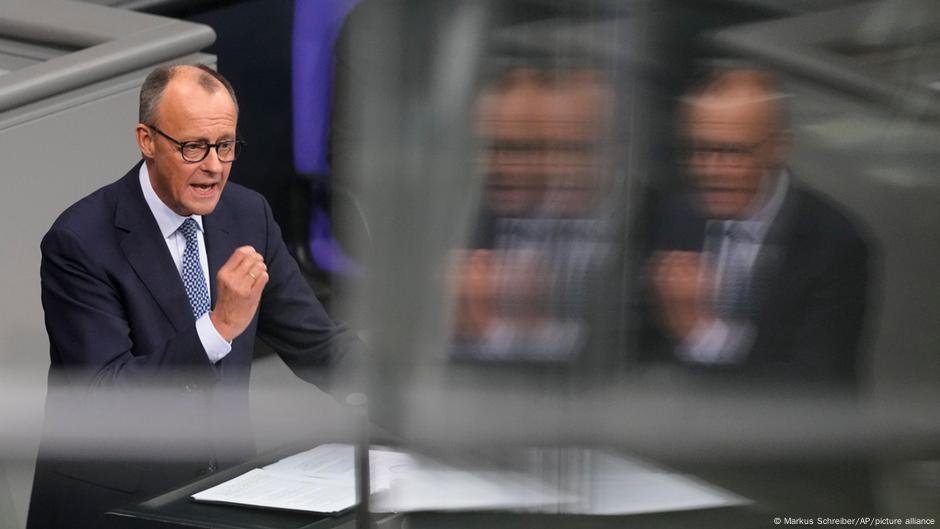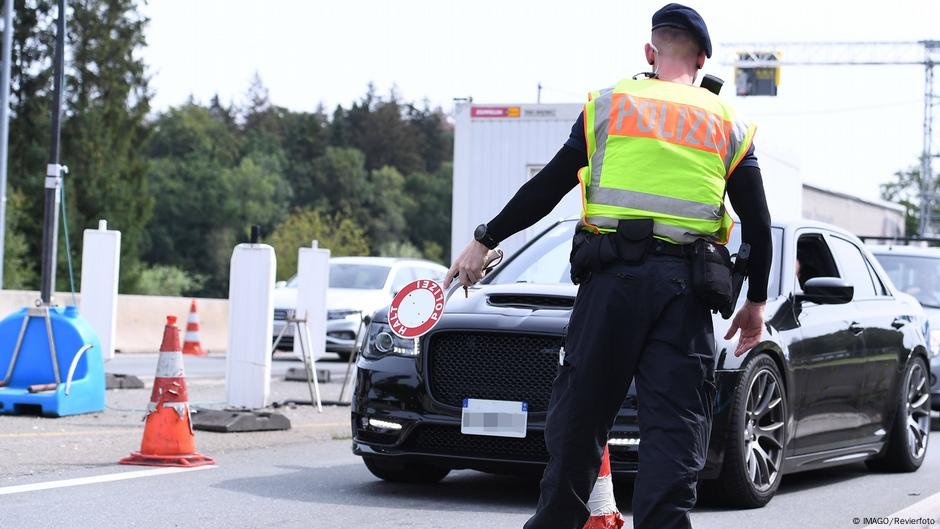Germany's lower house of parliament, the Bundestag, has approved a motion for a stricter migration policy, including permanent border checks. What impact will this have in the coming months, and are the recommendations put forth by the conservative CDU party legally sound? InfoMigrants takes a closer look.
Conservative opposition leader Friedrich Merz from the CDU party, who is tipped to become the country's next chancellor, tabled the motion on January 28 and narrowly won the vote on the motion in the Bundestag on January 29 – chiefly with the support of the far-right Alternative for Germany (AfD) party.
In the German Bundestag, a motion ("Entschließungsantrag") serves as a recommendation or request for the government on a specific issue. While non-binding, such motions are often introduced alongside legislative proposals to provide additional guidance. In this case, the motion was submitted ahead of the so-called "Influx Limitation Act" ("Zustrombegrenzungsgesetz"), proposed by the CDU/CSU, which is set for a vote in the Bundestag on Friday (January 31). The draft law calls for curbing the "illegal influx of third-country nationals" and suspending family reunification for individuals with subsidiary protection status.
Many lawmakers are against the conservatives' proposals, citing potential political implications that could erode the fabric of the European Union.
Although the motion passed on Wednesday is non-binding and has no immediate legal effects, it has sparked widespread debate among political commentators.

What exactly was passed?
The motion consists of a five-point action plan on changes to potentially be introduced to Germany’s immigration law.
It calls for permanent border checks; the rejection of any and all asylum applications lodged by migrants who arrive in Germany using irregular means of travel; the pre-deportation detention of all foreigners who have exhausted their appeals against their return; more support and funds to be made available to all of Germany’s 16 federal states to ensure that those who are pegged to be returned to their countries of origin are indeed sent back accordingly; and a further tightening of laws against criminal foreigners or those deemed to be a risk to society.
The motion was presented following a series of deadly attacks in Germany (in Solingen, Mannheim, Magdeburg and Aschaffenburg) at the hands of various foreign citizens, who are deemed to have been radicalized in one shape or another.
Read AlsoGermany: Deportations up by 30%

What does this mean for migrants, refugees and asylum seekers right now?
Nothing changes as of now, as the motion is not a legally binding document. It can at best be regarded as a declaration of intent to explore new laws in the future in line with what it states.
For example, if the CDU wins the mandate to form a new government after the upcoming election – as is expected – the motion can serve as potential leverage when the party enters coalition talks with other parties.
The party could demand concessions from coalition partners to meet the CDU halfway on the individual points of the motion in case it is presented as draft law.
It can also potentially present the motion as a proposed law even if it were to run a minority government, with all other parties being in opposition. In that scenario, it could bank on right-wing support from the AfD party, and potentially from the business-oriented FDP, if the latter manages to cross the 5 percent threshold to enter the Bundestag.
Read AlsoFact check: Deportation misinformation in Germany
Why is the passing of the motion regarded as significant?
Even if the motion fails to be passed as law in the future, it now has to be presented to the Bundestag and discussed at great length.
Getting the necessary minimum votes in the Bundestag to reach this next step was only made possible with the help of the far-right AfD party.
In the past, all major parties had categorically ruled out the idea of working with the AfD on any policy issue.

This move, however, could be interpreted as a break away from that convention and could even be seen as a sense of rapprochement between the CDU and the anti-migrant AfD, which could in the future mean that the AfD’s positions on migration have to at least be entertained in the Bundestag by other parties as well.
Thus far, working with the AfD was considered a taboo.
Are the CDU plans tabled in the motion even legal?
Certain aspects of the motion would require a major change in the direction of Germany’s overall policies, which many find unrealistic. For example, in order to reintroduce permanent border controls, the German government will not be able to keep prolonging declarations of states of emergency for years on end.
The only way to reestablish border controls in the long term would be for Germany to leave the EU’s Schengen zone – of which Germany historically is one of the main supporters and advocates. If that were to happen, other EU countries might follow suit, which could endanger the integrity of the European Union as a whole.
It is unlikely that the CDU under Merz would take such measures, which makes at least certain aspects of his motion unrealistic, to say the least.
Read AlsoGermany: Are conservatives' plans on immigration legal?

Further questionable aspects of the law include the rejection of asylum seekers without official papers at the German border. This, too, would be in breach of various stipulations of the EU’s Dublin III Agreement, which ensures that everyone’s asylum case has to be heard and processed.
Other aspects, while legal, might simply not be pragmatic. Many of the measures suggested in the motion require the hiring of further policemen and women. However, even the quickest apprenticeship in the police force takes at least three years.
In other words, even if the motion was made law on the first day of Merz’s chancellorship, it would take a minimum of three years to apply the pledges made, which by that time (and with only another year to go until the next elections) could likely frustrate voters who cast their votes for the CDU and for Merz.
Read AlsoGerman elections: Conservatives promise more restrictive migration policies
What happens next?
The result of the German elections on February 23 will chart much of the course forward for any further changes in asylum law in Germany, including those tabled by this divisive motion.
However, in the meantime, on January 31, the Bundestag will vote on the draft law to limit – and possibly stop – family reunions of recognized refugees, whose protection status is not full asylum but a limited status (such as subsidiary protection).
